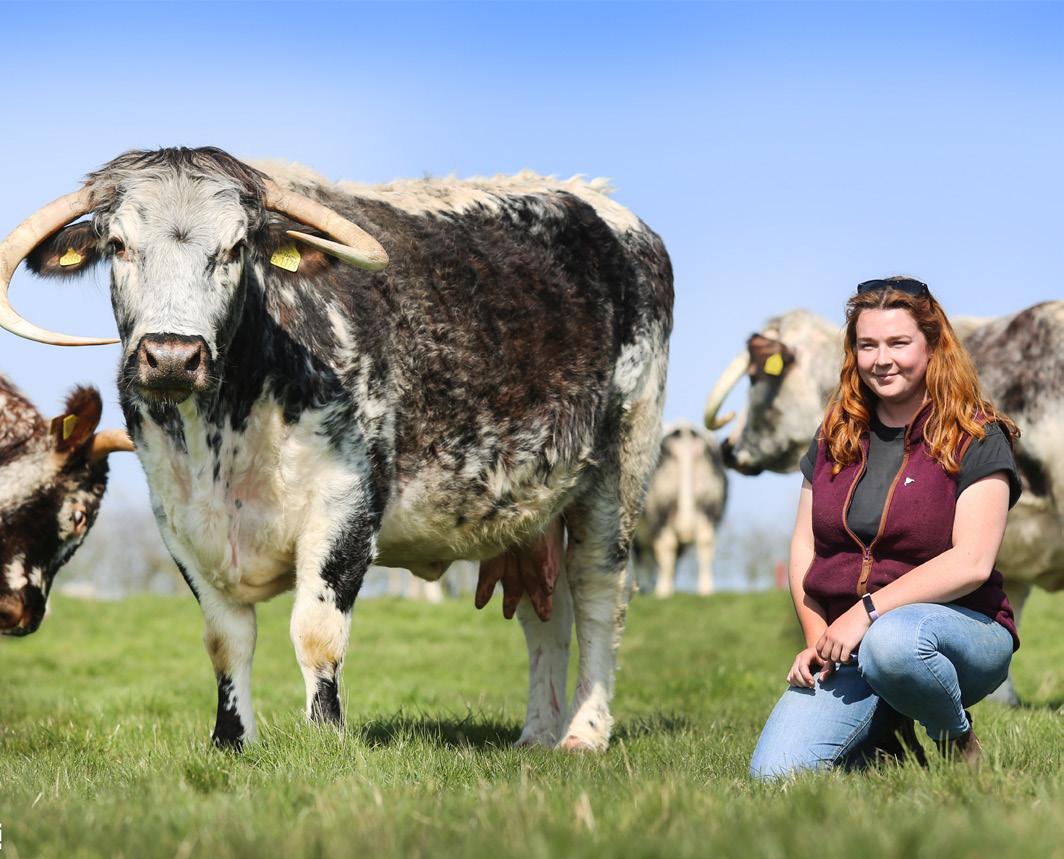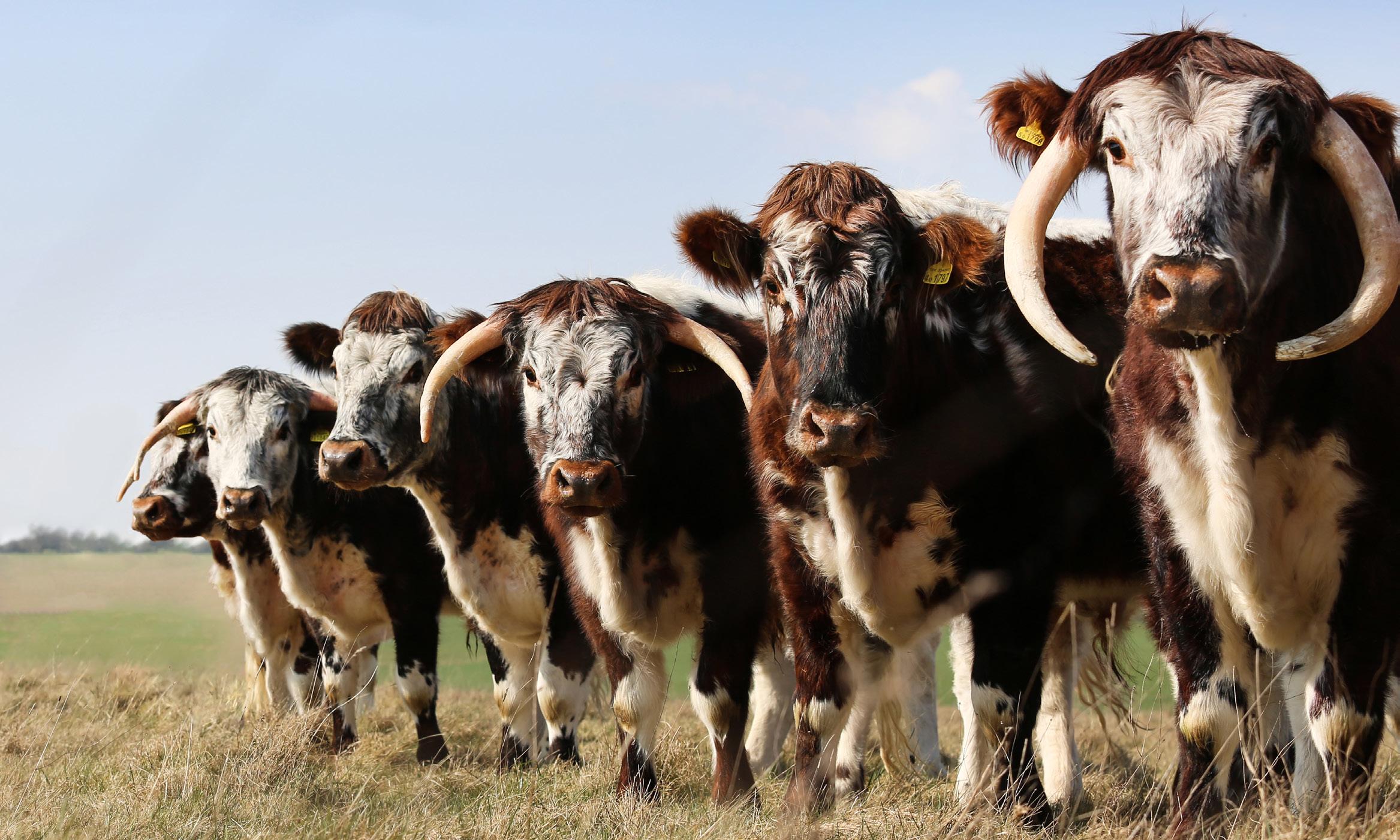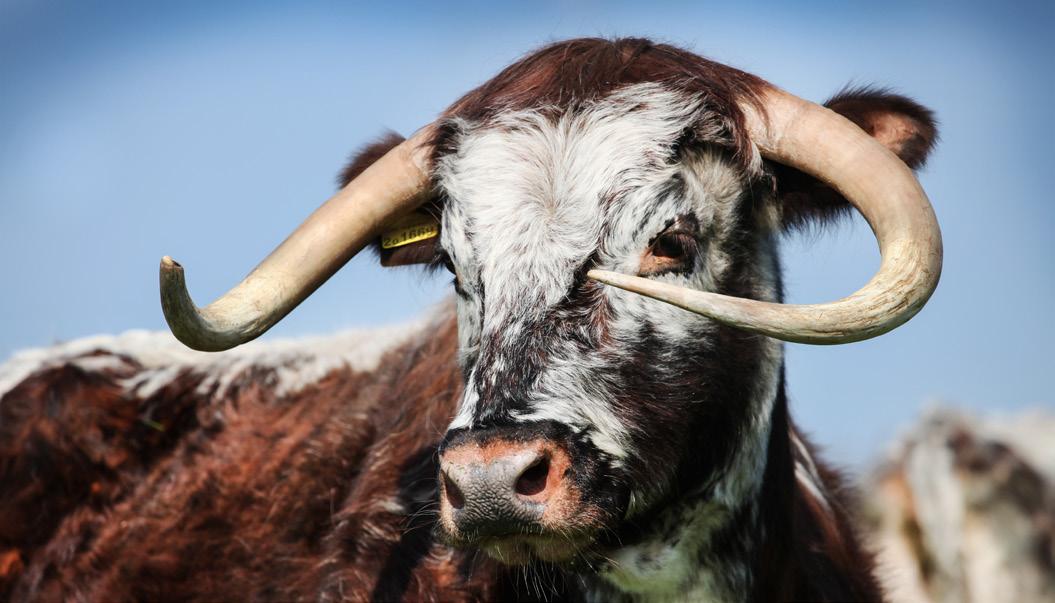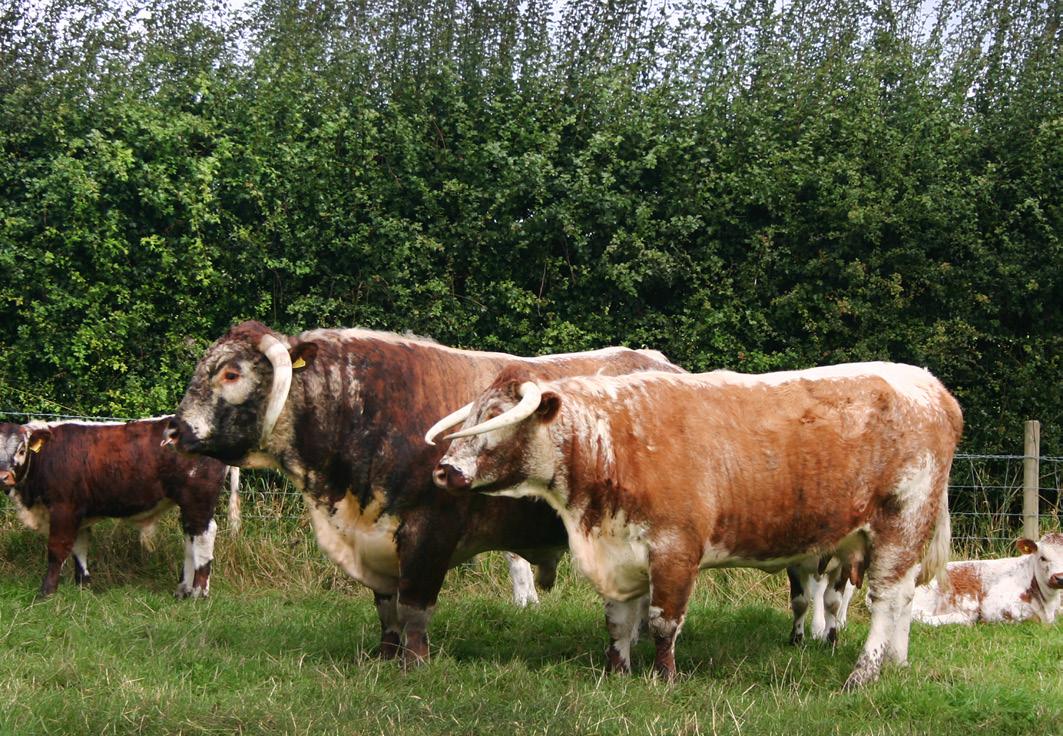
5 minute read
PROVES TO BE THE PERFECT CHOICE FOR NATURAL ENGLAND
In the 1930’s environmentalist Robert Wales was hoping to establish a herd of cattle that would not only compliment the species rich chalk downland of Parsonage Down, but also would work with this extensive area of flat, gently sloping ground on the southern edge of Salisbury Plain.
The adaptability and ease of management of the Longhorn appealed to Robert and the Stoke herd was soon established. With the correct stocking rate, he realised the cattle benefitted the area and in turn the area benefitted the naturally foraging herd of cattle with its botanically-rich, undisturbed grasslands. During this time, Robert became incredibly passionate about Longhorns and the ability of the breed to compliment and enrich nature and he worked tirelessly to promote its qualities even during the early rise of the continental breeds.
Advertisement
In 1979 Robert bequeathed the Stoke herd and Cherry Lodge Farm to the Nature Conservancy Council (now Natural England) for their guardianship of his lifetimes work going forward.
Over the years different farm managers had varying takes on the type of Longhorn farmed at Cherry Lodge Farm, but the Longhorn has remained pride of place, as was Robert’s wishes. The current herd manager, Elise Sutton, says it is particularly interesting to see the photographs of the styles of cow which have been kept here over the years, but the stockier types do better on our rougher ground.
Today, some 50 Longhorn cows run the 700acre farm which ranges from protected land to paddocks. Parsonage Down runs over 600 acres and is a SSSI site with five other designations also.
The running of Longhorn cattle on this difficult terrain is a real testament to the breed. In some places it is so steep that you wouldn’t contemplate taking a vehicle out on it, explains Elise. “These are working cattle, they are here to do conservation grazing which is a hugely important role, without them we would lose many of our incredible species. The yellow meadow ant hills for example make checking stock challenging for us at times, but the cattle thrive in this environment.”

The fully organic, 100% pasture fed, low input Stoke herd is very much part of the local landscape, but is also a large part of local heritage also. Cows are slow maturing calving at three years of age. “We aim to buy in a bull and use a homebred bull to cover both groups of females. We try to stay as local as possible with our purchases to avoid a tricky transition on to the chalk down grazing here,” explains Elise.
The current bought-in stock bull is Etheridge Spark from Dave and Carla Phillips, Dorchester. Sired by Long Ash Ohola, out of a Fosseway Acorn cow and classified EX90, Spark has certainly made an impression at Stoke. “Spark was chosen to add some height and length to the herd. He is a lovely natured bull with great genetics which we wanted to add,” comments Elise.
The current homebred bull on the farm is Stoke Sir-Loin, a 2018-born son of Aberdeen Ossian and out of Stoke Omlette. “He’s a stocky bull and represents what you would expect from our farming system. He has always outwintered and has great feet and legs which is vital here,” she adds.
Meanwhile, the 2021-born Stoke Valiant has been retained to become the junior stock bull. By Durham Mickey and out of Homington Susanna, Elise is sure he has a promising future, having purchased the dam locally from the Homington herd.
The Stoke herd is a member of the Premium Cattle Health Scheme and tests for BVD, Lepto, Johne’s, Neospora and IBR so any purchases in to the herd are kept to an absolute minimum.

Calving takes place between the end of March and end of May and calves are weaned at about nine months of age. During this time a rotational grazing system is in place, cows are outwintered and supplemented with only hay on the chalk down, which does not poach due to the soil type.
During this period cows are pulling out the old grass growth which is then mopped up by the flock of Exlana sheep grazing, benefitting wild flowers in the spring. As a typical Longhorn trait, longevity within the herd is impressive with cows of 11 years of age still thriving on the chalk down with their calves at foot.
Weaned calves are wintered in sheds which Elise sees as more beneficial for them. Steers outwinter for most of their lives, but are brought inside for those final weeks of finishing in order to maintain body condition score before slaughter.
In September 2020 a beef box scheme began at Cherry Lodge with six extensively reared animals being slaughtered in the first year. “Mainly steers are killed but the intramuscular fat in the heifers that were sent off was exceptional.” Elise is passionate about keeping things as local as possible with neighbouring abattoir C and S Meats carrying out the killing and Blackmore Vale Butchery carrying out the cutting, butchery and packing for us. “The meat receives excellent feedback creating a waiting list that spans the next two cattle to be killed,” she adds.
Meanwhile in the fields, clovers, Timothy and wild flowers are sewn in order to not only produce more food on site, but to enhance the ecosystem for wildlife also.
Although the farm is government funded, Elise is still accountable for the bottom line. She sees a good income from selling stock including 13 stores sold at the local Frome Livestock Auction which flew to £1300 per head with stock bulls being sold recently to a top of £2800.
The Stoke herd made its reappearance in the show ring in 2021, which Elise admits was a learning curve. “This was my first time showing and it was a challenge to say the least. We exhibited at the local Gillingham and Shaftesbury Show and hope to go further afield in 2022. Shows are an important shop window to us both for selling breeding animals and beef boxes,” explains Elise.
Having joined the team at Cherry Lodge in June 2020 straight from Harper Adams University College, Elise isn’t from a farming background, but was plunged straight in to harvest, followed by calving season. She has now seen all the seasons with the Stoke herd and admits to being head over heels in love with the breed.
“I find the ability of the Longhorn to convert poor grazing into high quality beef to be incredibly satisfying. The Longhorn prospers here where a lot of other breeds would struggle, while their kind nature and ease of management makes them great to work with,” adds Elise.


“Collection of the boxes allows interaction with the public which is something I am really keen to promote and maintain. We produce nature friendly, high welfare, sustainable beef which is a premium product, therefore, we welcome members of the public to the farm with a view of complete transparency,” comments Elise. Cattle are killed at over 30 months to suit the extensive system and in 2021 averaged 386kg which has seen a whole animal gross £2800.00 in boxes.
As well as the ethical rearing of the beef, Elise also has concerns over addressing the carbon footprint of the farm. At Cherry Lodge they look to be transparent and farm in a way that looks at long term stability through traceability on all levels. When it comes to looking at regenerative agriculture, the farm runs solar panels to light the sheds and run-off from the yards grows willow to feed the biomass boiler fuelling the farm office. “We are constantly looking at ways to be self-sufficient and sustainable and are currently looking to change to electric vehicles and quad bikes to lower our emissions,” explains Elise.











